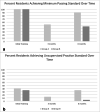See One, Do One, Forget One: Early Skill Decay After Paracentesis Training
- PMID: 32968968
- PMCID: PMC8131447
- DOI: 10.1007/s11606-020-06242-x
See One, Do One, Forget One: Early Skill Decay After Paracentesis Training
Abstract
Introduction: Internal medicine residents perform paracentesis, but programs lack standard methods for assessing competence or maintenance of competence and instead rely on number of procedures completed. This study describes differences in resident competence in paracentesis over time.
Methods: From 2016 to 2017, internal medicine residents (n = 118) underwent paracentesis simulation training. Competence was assessed using the Paracentesis Competency Assessment Tool (PCAT), which combines a checklist, global scale, and entrustment score. The PCAT also delineates two categorical cut-point scores: the Minimum Passing Standard (MPS) and the Unsupervised Practice Standard (UPS). Residents were randomized to return to the simulation lab at 3 and 6 months (group A, n = 60) or only 6 months (group B, n = 58). At each session, faculty raters assessed resident performance. Data were analyzed to compare resident performance at each session compared with initial training scores, and performance between groups at 6 months.
Results: After initial training, all residents met the MPS. The number achieving UPS did not differ between groups: group A = 24 (40%), group B = 20 (34.5%), p = 0.67. When group A was retested at 3 months, performance on each PCAT component significantly declined, as did the proportion of residents meeting the MPS and UPS. At the 6-month test, residents in group A performed significantly better than residents in group B, with 52 (89.7%) and 20 (34.5%) achieving the MPS and UPS, respectively, in group A compared with 25 (46.3%) and 2 (3.70%) in group B (p < .001 for both comparison).
Discussion: Skill in paracentesis declines as early as 3 months after training. However, retraining may help interrupt skill decay. Only a small proportion of residents met the UPS 6 months after training. This suggests using the PCAT to objectively measure competence would reclassify residents from being permitted to perform paracentesis independently to needing further supervision.
Keywords: assessment; competency-based medical education; paracentesis; procedures; skill decay.
Conflict of interest statement
Dr. Jennifer O’Toole consulted with and received honoraria payment from the I-PASS Patient Safety Institute. She also holds stock options in the I-PASS Patient Safety Institute, a non-publicly traded company.
Figures


Comment in
-
Letter to the Editor in Response to: Early Skill Decay After Paracentesis Training.J Gen Intern Med. 2021 Jun;36(6):1794. doi: 10.1007/s11606-021-06720-w. Epub 2021 Apr 1. J Gen Intern Med. 2021. PMID: 33796982 Free PMC article. No abstract available.
-
In Reply to Wayne et al.J Gen Intern Med. 2021 Jun;36(6):1795-1796. doi: 10.1007/s11606-021-06723-7. Epub 2021 Apr 5. J Gen Intern Med. 2021. PMID: 33821412 Free PMC article. No abstract available.
Similar articles
-
Mastery learning of thoracentesis skills by internal medicine residents using simulation technology and deliberate practice.J Hosp Med. 2008 Jan;3(1):48-54. doi: 10.1002/jhm.268. J Hosp Med. 2008. PMID: 18257046
-
Paracentesis Simulation: A Comprehensive Approach to Procedural Education.MedEdPORTAL. 2018 Aug 30;14:10747. doi: 10.15766/mep_2374-8265.10747. MedEdPORTAL. 2018. PMID: 30800947 Free PMC article.
-
Asking for help: internal medicine residents' use of a medical procedure service.J Hosp Med. 2009 Sep;4(7):404-9. doi: 10.1002/jhm.434. J Hosp Med. 2009. PMID: 19753572
-
Using the ACGME Milestones for Resident Self-Evaluation and Faculty Engagement.J Surg Educ. 2016 Nov-Dec;73(6):e150-e157. doi: 10.1016/j.jsurg.2016.09.001. J Surg Educ. 2016. PMID: 27886973 Review.
-
Initial performance of a modified milestones global evaluation tool for semiannual evaluation of residents by faculty.J Surg Educ. 2013 Nov-Dec;70(6):739-49. doi: 10.1016/j.jsurg.2013.08.004. J Surg Educ. 2013. PMID: 24209650 Review.
Cited by
-
Cohort study of hospitalists' procedural skills: baseline competence and durability after simulation-based training.BMJ Open. 2021 Aug 16;11(8):e045600. doi: 10.1136/bmjopen-2020-045600. BMJ Open. 2021. PMID: 34400443 Free PMC article.
-
The Impact of a Paracentesis Clinic on Internal Medicine Resident Procedural Competency.Fed Pract. 2024 Feb;41(2):48-51. doi: 10.12788/fp.0449. Epub 2024 Feb 12. Fed Pract. 2024. PMID: 38835926 Free PMC article.
-
Does an instructional video as a stand-alone tool promote the acquisition of practical clinical skills? A randomised simulation research trial of skills acquisition and short-term retention.BMC Med Educ. 2024 Jul 2;24(1):714. doi: 10.1186/s12909-024-05714-6. BMC Med Educ. 2024. PMID: 38956562 Free PMC article. Clinical Trial.
References
MeSH terms
LinkOut - more resources
Full Text Sources
Miscellaneous

